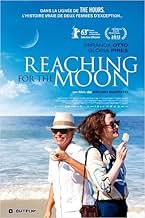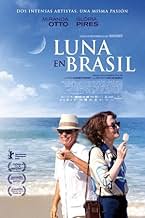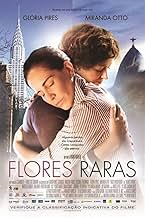IMDb रेटिंग
7.0/10
3.7 हज़ार
आपकी रेटिंग
अपनी भाषा में प्लॉट जोड़ेंA chronicle of the tragic love affair between American poet Elizabeth Bishop and Brazilian architect Lota de Macedo Soares.A chronicle of the tragic love affair between American poet Elizabeth Bishop and Brazilian architect Lota de Macedo Soares.A chronicle of the tragic love affair between American poet Elizabeth Bishop and Brazilian architect Lota de Macedo Soares.
- पुरस्कार
- 9 जीत और कुल 21 नामांकन
फ़ीचर्ड समीक्षाएं
After the famous poet, Elizabeth Bishop, is greatly mentored by the star poet Robert Lowell, she, travels to Brazil, on her inheritance, has a love affair with a wealthy, female architect, who is in another love relationship with a former fellow student of Bishop's at Vassar College, called Mary. This threesome love relationship fails because each person involved in this relationship has a main flaw. Bishop's flaw is alcoholism. The architect's flaw is that she works herself to the point of mental insanity. Mary's flaw is jealousy. She does not want to share her architect girlfriend with Elizabeth Bishop, understandably.
When watching the film in the cinema, yesterday, with the oranges and the red wine, I bought at the booth, all of us clapped at the end of the film, with wonderful actors, very beautiful scenery of Brazil as well as fantastic architecture, before tortillas, guacamole, nachos, corona and other Latin American snacks that were cheaply sold outside.
This positive account begs the question, why I did not rate that film to be so good. Like many art-house or like many artsy films, Reaching for the Moon, we hardly know who most of the characters in this film truly are. There is just not enough character development in the film. We do not know what exactly makes Miss Bishop travel, why she loves this architect, why the architect loves her and why Mary loves this architect. We also do not know their views about belonging to a sexual minority. We do not know the reason for their flaws, such as the traumatic experiences that made Miss Bishop an alcoholic, what made the architect a workaholic, who does not talk to her family, and we know almost nothing about this third girl Mary, except that she went to University with Miss Bishop.
We do not know the exact cause or even the nature of the architect's insanity. When she kills herself, she leaves no note, and nobody even asks or tries to find out why the hell she did it or if it was an accident.
Like most films about poetry little attention is paid to the kind of Poetry Miss Bishop wrote, so that when she wins the National Book Award and the Pulitzer Prize, in the film, you still end up leaving the movie theatre wondering why her poetry was considered to be so special, apart from the fact that she was rich, well educated and knew some of the greatest poets like Robert Lowell and Marian Moore.
This film is full of paper Mache' characters, in which you hardly know who the people in the film are, despite the strong attempts of the actors in the film to act as well as possible, which made the film worth watching, especially as a poet and author myself, amongst other things.
When watching the film in the cinema, yesterday, with the oranges and the red wine, I bought at the booth, all of us clapped at the end of the film, with wonderful actors, very beautiful scenery of Brazil as well as fantastic architecture, before tortillas, guacamole, nachos, corona and other Latin American snacks that were cheaply sold outside.
This positive account begs the question, why I did not rate that film to be so good. Like many art-house or like many artsy films, Reaching for the Moon, we hardly know who most of the characters in this film truly are. There is just not enough character development in the film. We do not know what exactly makes Miss Bishop travel, why she loves this architect, why the architect loves her and why Mary loves this architect. We also do not know their views about belonging to a sexual minority. We do not know the reason for their flaws, such as the traumatic experiences that made Miss Bishop an alcoholic, what made the architect a workaholic, who does not talk to her family, and we know almost nothing about this third girl Mary, except that she went to University with Miss Bishop.
We do not know the exact cause or even the nature of the architect's insanity. When she kills herself, she leaves no note, and nobody even asks or tries to find out why the hell she did it or if it was an accident.
Like most films about poetry little attention is paid to the kind of Poetry Miss Bishop wrote, so that when she wins the National Book Award and the Pulitzer Prize, in the film, you still end up leaving the movie theatre wondering why her poetry was considered to be so special, apart from the fact that she was rich, well educated and knew some of the greatest poets like Robert Lowell and Marian Moore.
This film is full of paper Mache' characters, in which you hardly know who the people in the film are, despite the strong attempts of the actors in the film to act as well as possible, which made the film worth watching, especially as a poet and author myself, amongst other things.
Reaching for the Moon (2013)
Wonderful! The story of the Brazilian years of the great North American poet, Elizabeth Bishop. There are so many beautiful aspects to the characters, their setting, and their relationships it's hard to know where to begin. And even better, on top of all this, is the historical recreation of the times, and the changing political climate of Brazil. It's touching and uplifting and tragic.
The original title of this is "Flores Raras" because these were indeed rare people, and doing beautiful things. And yes, they were reaching for the moon but you might rather say they reached the moon. Succeeding at something is more than literally fulfilling.
The plot has a slightly meandering, unfamiliar arc through the main events, and there are times when you think one thing and then suddenly another happens. Don't blame bad writing, but rather realize that this is how life is, and how it really was. Remember as well that these are artists of privilege at work, they have money and education and act with a kind of license and liberation that we all should feel. And so it's unpredictable.
As a kind of true insight into the poetic process you might find few parallels in the movies. You learn their temperaments, and how circumstances make the artist and the poet come to their best. The intimate circumstances are about love, a really true deep love that grows between these two women. Their professional needs reinforce and conflict with their personal needs, but they make it work.
The outside circumstances are hard to understand from 2014. Brazil was once a very different country, filled with far more freedom and sense of liberation. (This seems to be a direction that are pointed in again, though going through fits and starts.) But the world in post-War Brazil was one of possibility. It was a haven (not just for ex-Nazis) and a growing "New World," but it was also stuffed with poverty (which the movie ignores), a legacy still at hand.
And this is exciting stuff. The movie moves mostly through the confines of their big, gorgeous estate in the hills, but it also shows us the city, and the larger world. So Bishop and Lota de Macedo Soares, an important architect of the era. grow and suffer and see their world fall apart around them (Brazil fell under dictatorship in the mid 1960s). It's filmed with utter beauty, the acting is sharp and convincing, and the writing (not surprisingly) is fluid and tight. Great stuff.
Wonderful! The story of the Brazilian years of the great North American poet, Elizabeth Bishop. There are so many beautiful aspects to the characters, their setting, and their relationships it's hard to know where to begin. And even better, on top of all this, is the historical recreation of the times, and the changing political climate of Brazil. It's touching and uplifting and tragic.
The original title of this is "Flores Raras" because these were indeed rare people, and doing beautiful things. And yes, they were reaching for the moon but you might rather say they reached the moon. Succeeding at something is more than literally fulfilling.
The plot has a slightly meandering, unfamiliar arc through the main events, and there are times when you think one thing and then suddenly another happens. Don't blame bad writing, but rather realize that this is how life is, and how it really was. Remember as well that these are artists of privilege at work, they have money and education and act with a kind of license and liberation that we all should feel. And so it's unpredictable.
As a kind of true insight into the poetic process you might find few parallels in the movies. You learn their temperaments, and how circumstances make the artist and the poet come to their best. The intimate circumstances are about love, a really true deep love that grows between these two women. Their professional needs reinforce and conflict with their personal needs, but they make it work.
The outside circumstances are hard to understand from 2014. Brazil was once a very different country, filled with far more freedom and sense of liberation. (This seems to be a direction that are pointed in again, though going through fits and starts.) But the world in post-War Brazil was one of possibility. It was a haven (not just for ex-Nazis) and a growing "New World," but it was also stuffed with poverty (which the movie ignores), a legacy still at hand.
And this is exciting stuff. The movie moves mostly through the confines of their big, gorgeous estate in the hills, but it also shows us the city, and the larger world. So Bishop and Lota de Macedo Soares, an important architect of the era. grow and suffer and see their world fall apart around them (Brazil fell under dictatorship in the mid 1960s). It's filmed with utter beauty, the acting is sharp and convincing, and the writing (not surprisingly) is fluid and tight. Great stuff.
Lovely. A story here that is not overshadowed by the relationships, politics, or agenda. It is, simply beautifully filmed, the beaches of Rio De Janeiro, the beautiful home Lota has deigned in part to accommodate her new lover, poet Elizabeth Bishop, completely played by Miranda Otto.
Otto is at once restrained yet yearning, a Vassar graduate visiting her friend, who initially is puzzled (and indeed overwhelmed) by the beauty and passion of South America.
She plays the American New England spinster type well, without a stereotype here. We can feel she wants, and NEEDS to break free from societal restraints.
The filming of the rain forests, the owls at night, the visuals are incredible. Lota Soares was politically connected and designed the park near Carioca beach, the title infers, reaching for the moon has so may more connotations for each woman.
What is most refreshing is the way this film is written, sensitive to the issues each woman experiences, it is an individual and a private journey.
The actress portraying Carlotta Soares is affecting and sad, and Miranda Otto is quite believable as Bishop. The story is beautiful and sad, and the scenery of Brazil is not to be missed, simply beautiful, and beautifully filmed. 10/10
Otto is at once restrained yet yearning, a Vassar graduate visiting her friend, who initially is puzzled (and indeed overwhelmed) by the beauty and passion of South America.
She plays the American New England spinster type well, without a stereotype here. We can feel she wants, and NEEDS to break free from societal restraints.
The filming of the rain forests, the owls at night, the visuals are incredible. Lota Soares was politically connected and designed the park near Carioca beach, the title infers, reaching for the moon has so may more connotations for each woman.
What is most refreshing is the way this film is written, sensitive to the issues each woman experiences, it is an individual and a private journey.
The actress portraying Carlotta Soares is affecting and sad, and Miranda Otto is quite believable as Bishop. The story is beautiful and sad, and the scenery of Brazil is not to be missed, simply beautiful, and beautifully filmed. 10/10
Reaching for the Moon is the kind of movie everyone hopes for but no one makes: a gay romance where "gay romance" is not the premise. Director Bruno Barreto focuses instead on how Elizabeth Bishop and Lota de Macedo Soares challenged and changed the world and each other in other ways, and that was absolutely the right choice - these women and their story are fascinating and make for top class entertainment.
And it is entertaining. Considering the characters' issues and the story's ending it could have been drab, but the film is always lively and engaging. It flies by. Bishop takes herself very seriously, but Barreto maintains a sense of humor about it and makes fun of her just enough to keep her melodrama under control. An added bonus is that Miranda Otto gets to show off her underrated and underused comedic chops; one particular drunk scene is priceless. Glória Pires is dynamic and fiery as Lota but Otto is the real star, channeling Greta Garbo and Deborah Kerr in a gracefully commanding performance. She doesn't shy away from Bishop's spikiness, but her screen presence is so compelling that as much as we might be frustrated with her character, we can't take our eyes off her. Thanks to her constantly surprising performance, an eclectic ensemble cast, breathtaking visuals, and assured direction, Reaching for the Moon pulses with energy and is a breath of fresh air in an era of stuffy and bland biopics.
Highlights: Shots of Rio de Janeiro that belong on postcards; a performance from Miranda Otto that would have won an Oscar in 1937; the assertion that some things are more important than whether a person is gay
Verdict: Watch this with your parents instead of Blue Is the Warmest Color
And it is entertaining. Considering the characters' issues and the story's ending it could have been drab, but the film is always lively and engaging. It flies by. Bishop takes herself very seriously, but Barreto maintains a sense of humor about it and makes fun of her just enough to keep her melodrama under control. An added bonus is that Miranda Otto gets to show off her underrated and underused comedic chops; one particular drunk scene is priceless. Glória Pires is dynamic and fiery as Lota but Otto is the real star, channeling Greta Garbo and Deborah Kerr in a gracefully commanding performance. She doesn't shy away from Bishop's spikiness, but her screen presence is so compelling that as much as we might be frustrated with her character, we can't take our eyes off her. Thanks to her constantly surprising performance, an eclectic ensemble cast, breathtaking visuals, and assured direction, Reaching for the Moon pulses with energy and is a breath of fresh air in an era of stuffy and bland biopics.
Highlights: Shots of Rio de Janeiro that belong on postcards; a performance from Miranda Otto that would have won an Oscar in 1937; the assertion that some things are more important than whether a person is gay
Verdict: Watch this with your parents instead of Blue Is the Warmest Color
I was sad to see this deeply moving, complex and intelligent story of the love between the award winning American poet Elizabeth Bishop and Brazilian architect Lota de Macedo Soares. so overlooked by U.S, audiences and critics. There are two outstanding performances by Miranda Otto as the outwardly shy and repressed alcoholic Bishop, and Gloria Pires as her opposite, an extroverted, highly emotional woman who coaxes Bishop out of her shell.
Very nicely photographed, this reminded me of the best of the Merchant-Ivory films. It's not flashy. Indeed there's a quiet to it that is needed to off-set the melodramatic (even if based in truths) elements of these women's lives. But that doesn't keep it from packing a hell of an emotional punch, and in being bold enough to create characters we care for, but who are also deeply troubled and capable of making bad choices – just like in the real world of relationships we rarely see on screen. It was also nice to see a gay-themed love story that both acknowledged how difficult being homosexual was in the 1950s, while not becoming a film about that only. This is a film about a complex relationship between two highly creative and wounded souls who both save and damage each other. The fact that both are women is only a small part of the larger story. It's also one of the only films I've seen capture at least a taste of the struggle and loneliness of the act of writing.
One of those little gems that deserves to be discovered by more people.
Very nicely photographed, this reminded me of the best of the Merchant-Ivory films. It's not flashy. Indeed there's a quiet to it that is needed to off-set the melodramatic (even if based in truths) elements of these women's lives. But that doesn't keep it from packing a hell of an emotional punch, and in being bold enough to create characters we care for, but who are also deeply troubled and capable of making bad choices – just like in the real world of relationships we rarely see on screen. It was also nice to see a gay-themed love story that both acknowledged how difficult being homosexual was in the 1950s, while not becoming a film about that only. This is a film about a complex relationship between two highly creative and wounded souls who both save and damage each other. The fact that both are women is only a small part of the larger story. It's also one of the only films I've seen capture at least a taste of the struggle and loneliness of the act of writing.
One of those little gems that deserves to be discovered by more people.
क्या आपको पता है
- ट्रिवियाFour paragraphs appear between the end of the film and the beginning of the credits.
1. "Few women write major poetry. Only four stand with our best men: Emily Dickinson, Marianne Moore, Elizabeth Bishop and Sylvia Plath." - Robert Lowell
2. "I'd rather be called the 'The 16th Poet' with no reference to my sex, than one of 4 women - even if the other three are pretty good." - Elizabeth Bishop
3. Elizabeth Bishop died in 1979 in the United States. She is considered on the most important poets of the English language.
4. In 2012, UNESCO declared the city of Rio De Janeiro a World Heritage site. The Flamengo Park is one of its main attractions.
- गूफ़Opening in 1951 but Bobby Vinton singing Blue Velvet was not until 1963.
- भाव
Elizabeth Bishop: It's OK. I'm not drunk. I'm just crying in English.
- क्रेज़ी क्रेडिटNine of the main performers (the first 10) are listed in the credits without the name of their character. Only Treat Williams is credited as his character, Robert Lowell.
- कनेक्शनReferenced in Programa do Jô: 26 अगस्त 2013 को प्रसारित एपिसोड (2013)
टॉप पसंद
रेटिंग देने के लिए साइन-इन करें और वैयक्तिकृत सुझावों के लिए वॉचलिस्ट करें
- How long is Reaching for the Moon?Alexa द्वारा संचालित
विवरण
- रिलीज़ की तारीख़
- कंट्री ऑफ़ ओरिजिन
- आधिकारिक साइटें
- भाषाएं
- इस रूप में भी जाना जाता है
- Reaching for the Moon
- फ़िल्माने की जगहें
- उत्पादन कंपनियां
- IMDbPro पर और कंपनी क्रेडिट देखें
बॉक्स ऑफ़िस
- US और कनाडा में सकल
- $45,502
- US और कनाडा में पहले सप्ताह में कुल कमाई
- $14,573
- 10 नव॰ 2013
- दुनिया भर में सकल
- $15,34,391
- चलने की अवधि
- 1 घं 58 मि(118 min)
- रंग
- पक्ष अनुपात
- 1.85 : 1
इस पेज में योगदान दें
किसी बदलाव का सुझाव दें या अनुपलब्ध कॉन्टेंट जोड़ें


























